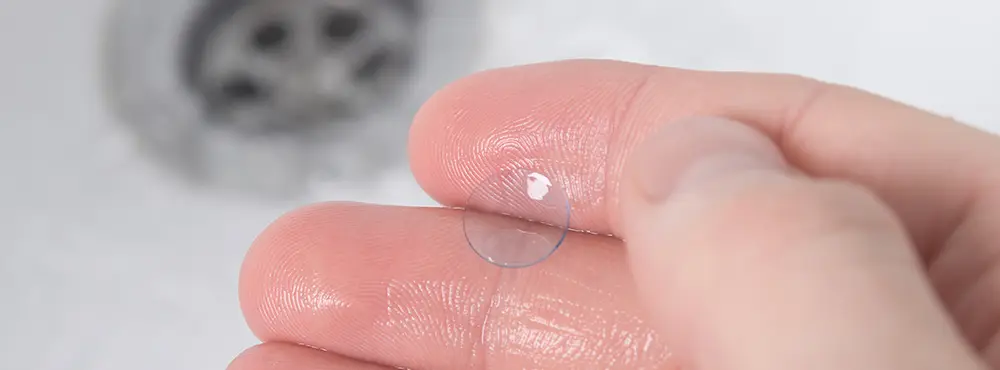As a contact lens wearer, you may run out of solution from time to time and wonder if you can simply wash your contact lenses in water. It’s only water, after all, right?
The answer is no. You should never clean or store your lenses with water as this can pose a serious risk to your eyes and may result in eye infection. Instead, you must use a contact lens solution to clean and disinfect your contact lenses overnight. Find out why below.
Why can I not clean my contact lenses with water?
Cleaning your lenses in water may be tempting as it is quick, easily accessible, and may seem harmless – but it’s actually extremely dangerous and can lead to permanent vision loss. This is because water contains harmful bacteria and microorganisms your eyes cannot fight off.
Let’s say you clean your contact lens with water and place this onto your eye; the harmful organisms can rapidly multiply and take hold. The cornea, unlike the other parts of the body, does not have a network of blood vessels to deliver immune cells – which is why bottled and tap water is safe to drink but cannot be used to clean contact lenses.
Infections such as acanthamoeba keratitis are caused by naturally occurring parasites that are found in water. This infection can be mistaken for a cold sore virus and may be treated inappropriately with steroids and become extremely difficult to get rid of.
Signs of acanthamoeba keratitis:
- Eye pain
- Eye redness
- Blurry vision
- Light sensitivity
- Excessive tearing
If you experience any of these symptoms, you should contact your eye practitioner immediately as this type of eye infection can result in vision loss or eye removal if left untreated.
Can I clean my contact lenses with distilled water?
No. Distilled water and bottled spring water still contain microorganisms that are harmful to contact lenses. Therefore, this is just as bad as cleaning your lenses with tap water and should be completely avoided – even if you run out of contact lens solution.
Cleaning your contact lenses in any type of water is not only harmful to the eye, but will also be very uncomfortable as it is different to tear moisture. However, this is not something that should be tested – simply use a contact lens solution to clean your lenses to avoid a nasty eye infection.
Additionally, you should never wear contact lenses when taking part in any water-based activities such as swimming, sauna, and steam rooms, as this can also result in infection.
Is contact lens solution made from water?
Contact lens solutions will have a different make-up, depending on the type of contact lens solution, as well as the manufacturer. However, the most common ingredient in a contact lens solution is a disinfectant, as this kills bacteria and harmful microorganisms.
Contact lens solutions can also include:
- Wetting solutions: To keep your lenses moist and comfortable
- Surfactants: This helps clear up any residue stuck to the surface of the lens
- Preservatives: To prolong the shelf life of the solution
An FDA-approved contact lens solution will never consist of just water.
What can I use instead of contact lens solution?
There are many online articles that suggest you can use or even create an alternative if you run out of contact lens solution. However, you should never try to substitute your lens solution or create your own formula. This can be very dangerous for the eye.
You should also ensure you are using the right contact lens solution for the type of contact lenses you wear. For soft lenses, you can use a multi-purpose solution or a hydrogen peroxide solution. For rigid gas permeable lenses, you’ll need to use a rigid gas permeable contact lens solution.
Using an incorrect solution for your type of contact lens can damage the lens and cause discomfort and irritation. If you’re not quite sure what type of contact lens solution you need, read our guide on this. However, you should always check which solution is most suitable for you and your lenses with your optician.
Contact lens care routine
Now you know you must avoid cleaning your contact lenses with water, and should instead use the appropriate contact lens solution – it’s a good idea to familiarise yourself with the cleaning process:
- Wash your hands thoroughly and use a lint-free towel to completely dry them.
- Take one lens out and place it in the palm of your hand.
- Cover the lens in your recommended cleaning solution.
- Using your fingertip, gently rub the lens in a circular motion to loosen any debris build-up.
- Rinse the lens with a saline or multi-purpose solution to remove any remaining debris.
- Fill a clean contact lens case with a disinfecting (or multi-purpose) solution.
- Place your lens inside the case and leave to disinfect for as long as the product packaging recommends. The disinfecting process is vital to killing microorganisms and removing them from the lens.
- Repeat with the other contact lens.
Read our full guide on contact lens care for more information on how to clean and store your contact lenses.
Quick links:
How to look after your contact lenses
How to clean a contact lens case
Can I swim with contact lenses?
Disclaimer: The advice in this article is for informational purposes only and does not replace medical care or an in-person check-up. Please check with an eyecare professional before purchasing any products or remedies. For information on our article review process, please refer to our Editorial Policy.

 Offers
Offers Account
Account
 Favorite
Favorite
 Basket
Basket

 OFFERS
OFFERS















